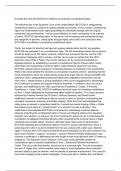Essay
ETVT SCOTUS effectively protects constitutional rights
- Course
- Institution
This essay for Edexcel A-Level Politcs earned a high A*. This essay effectively demonstrates the constitutional rights upheld by the Supreme Court of the United States. It follows the correct structure, utilises high levels of evaluation and includes and argues for many key SCOTUS cases.
[Show more]



